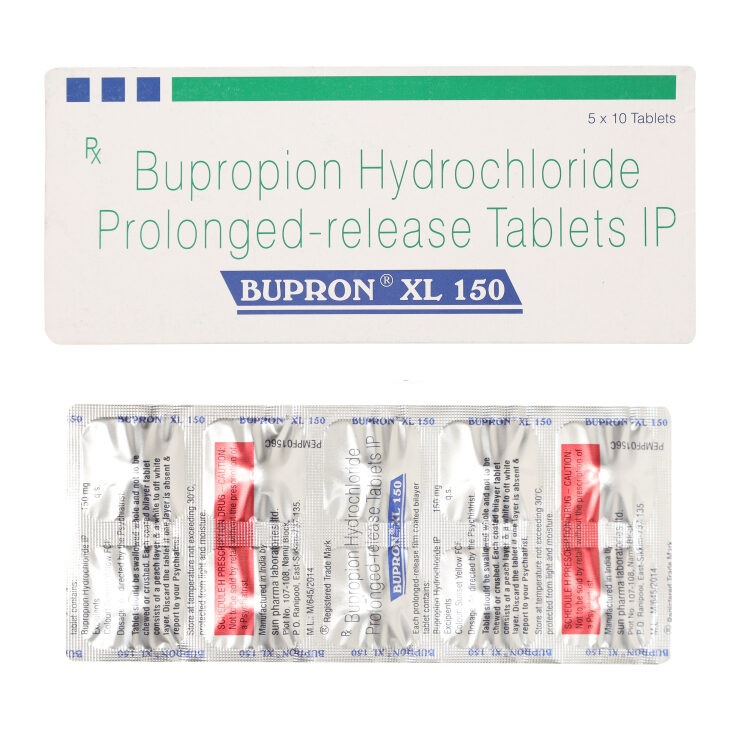Bupet 300mg Tablet XL 10s BUPROPION
Introduction to Bupet 300mg Tablet XL 10s
Bupet 300mg Tablet XL 10s is a medication primarily used to treat depression and seasonal affective disorder. It is also effective in aiding individuals to quit smoking by reducing cravings and withdrawal symptoms.
Composition of Bupet 300mg Tablet XL 10s
Bupet 300mg Tablet XL 10s contains Bupropion as its active ingredient. Bupropion is a norepinephrine-dopamine reuptake inhibitor (NDRI) that works by affecting neurotransmitters in the brain to improve mood and alleviate symptoms of depression.
Uses of Bupet 300mg Tablet XL 10s
- Treatment of depression
- Management of seasonal affective disorder
- Assistance in smoking cessation
Side effects of Bupet 300mg Tablet XL 10s
- Common side effects: dry mouth, insomnia, headaches
- Serious side effects: increased risk of seizures, mood changes, depression, suicidal thoughts
Precautions of Bupet 300mg Tablet XL 10s
It is important to avoid alcohol and substances that lower the seizure threshold while taking Bupet 300mg Tablet XL 10s. Do not use this medication if you have a seizure disorder or an eating disorder. Monitor for mood changes and consult your doctor if you experience any new or worsening symptoms.
How to Take Bupet 300mg Tablet XL 10s
Bupet 300mg Tablet XL 10s is typically taken as a tablet once or twice daily. The initial dose is usually 150 mg once a day, which may be increased to 300 mg daily, taken as 150 mg twice a day. Always follow your doctor's specific dosage instructions.
Conclusion of Bupet 300mg Tablet XL 10s
Bupet 300mg Tablet XL 10s, containing Bupropion, is a norepinephrine-dopamine reuptake inhibitor used to treat depression, seasonal affective disorder, and assist in smoking cessation. It is manufactured to provide effective relief from these conditions while requiring careful adherence to prescribed dosages and precautions. Bupet 300mg Tablet XL 10s is a valuable option for those seeking treatment for these conditions.


What if someone takes excess of Atydep?
Excess of Atydep may cause fast heartbeat, drowsiness, changes in electrical activity of heart (arrhythmias, QT prolongation) and loss of consciousness. The patient should be given immediate medical support.

Can I take Atydep if I am already taking captopril for blood pressure control?
You may take Atydep while taking captopril, but you need to get your blood pressure regularly checked. Atydep can increase your blood pressure even if you are taking captopril. If your blood pressure increases, then consult your doctor immediately since you may have to stop Atydep.

Is it normal to get red eyes after starting Atydep?
No, it is very rare to develop eye problems such as redness in and around the eyes, eye pain and blurred vision. Consult your doctor if you notice any such side effect or want to know if you are at risk or not. You can even receive preventative treatment if you are at risk.

What if someone takes excess of Bupron?
Excess of Bupron may cause fast heartbeat, drowsiness, changes in electrical activity of heart (arrhythmias, QT prolongation) and loss of consciousness. The patient should be given immediate medical support.

Is it normal to get red eyes after starting Bupron?
No, it is very rare to develop eye problems such as redness in and around the eyes, eye pain and blurred vision. Consult your doctor if you notice any such side effect or want to know if you are at risk or not. You can even receive preventative treatment if you are at risk.

What are the factors that can increase chances of seizures with Bupron?
The risk of seizure appears to be strongly associated with the dose of Bupron. Increasing your dose of Bupron may increase the risk. The risk of seizure increases with regular intake of alcohol, diabetes, serious head injury or history of head trauma, previous seizures, central nervous system tumor or infection, or addiction to cocaine, opiates or stimulants. The risk also increases with simultaneous use of medicines to treat psychosis or depression, theophylline and oral corticosteroids or if you are taking medicines that cause loss of appetite (anorectics).









.svg)
